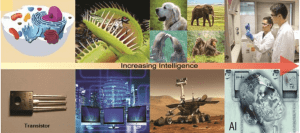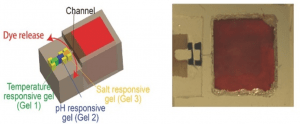Chemical Engineering is a discipline that traditionally involves the engineering of the operation of a facility that allows the mass-production of a product. The needs for Chemical Engineers are widespread and include a wide range of industries, such as the petrochemical, chemical, pharmaceutical, semiconductor, and materials industries. Within the scope of Chemical Engineering involves the diverse types of operation of the plant that include analytical operations (e.g., the distributed control system in the control room and controllers), regulatory operations (e.g., maintaining the temperature, pressure, and level), and practical operations (e.g., separation, purification, or synthesis). Instead of the large-scale manufacturing plant, our research in Chemical Engineering involves the creation of self-powered small-scale systems with advanced functions. We use the fundamental principles of Chemical Engineering for the design of our systems, including heat and mass transfer, fluid mechanics, reaction kinetics, and thermodynamics. In addition, knowledge of the operations of the systems are needed, including separation and process control and dynamics. In addition to these traditional topics of Chemical Engineering, the design of our systems also involves chemistry and materials science. In terms of chemistry, we use interesting molecules, molecular interactions, and reactions that are needed for the desired functions of our systems. In terms of materials science, we use advanced types of materials, such as the class of stimuli-responsive materials (i.e., materials that are powered by an external stimuli, such as temperature, pressure, or concentration of a chemical species). In summary, the design and creation of the self-powered small-scale systems involves the principles of Chemical Engineering, molecular designs of Chemistry, and advanced materials in Materials Science. The emerging field of research that seeks to create a “living system” — such as an artificial cell — is an ambitious objective of many chemists and biologists. In this area, we aim to use the Chemical Engineering approach to contribute to this field of creating “intelligent” systems. Based on the fundamental principles of heat and mass transfer between stimuli-responsive materials and their surroundings, we used these materials to demonstrate various intelligent functions. These could be broadly classified as analytical, process control, applications and transport of charge. 
Heat and mass transfer for analysis
We used different types of stimuli-responsive hydrogels to design various systems of chemical logic gates. By using the effect of heat transfer between temperature responsive hydrogels and the surroundings, as well as mass transfer of ions between pH/salt responsive hydrogels and the surroundings, these systems would be useful in achieving analytical functions. They could be used for the detection as well as analysis of various input signals, with a logical output being produced. This could be useful for applications such as computation for information technology, design of devices for recording memory, diagnostics and many others. 1 
Process control with intelligence material
We also demonstrated regulatory functions based on heat and mass transfer between stimuli-responsive hydrogels and their surroundings. We were able to control the wettability of the hydrogel surface using external stimulus (changes in pH and temperature). These materials which have controllable wettability could be used in applications such as site-specific delivery of drugs and controlling the separation of water and oil. We used these hydrogels for regulating the release of dye solution from various reservoirs into the surroundings. 2 
Application
The use of stimuli-responsive hydrogels to achieve practical functions could also be based on the fundamental principles of heat and mass transfer between the hydrogels and their surroundings. We made use of these hydrogels to design a general class of grippers which are soft and untethered. Different stimuli-responsive hydrogels were used together to design a soft responsive machine which could grip onto objects and move them. These grippers could also be useful for manufacturing and surgery purposes. 3 
Transport of charge
Apart from being applied in the design of systems which demonstrate intelligent functions, fundamental principles in chemical engineering could also be applied towards the transport of charge. We have demonstrated that molecular ions could be transported into the bulk of organic liquids, allowing these liquids to be charged effectively. This observation is related to the fundamental chemical engineering principle of transport phenomena. The charging of such liquids could have various applications, including electrostatic coating, electrospinning of nanomaterials for chemical and biological sensors, as well as generation of power. 4  Resources
Resources
- Zhang, X., & Soh, S., Performing Logical Operations with Stimuli‐Responsive Building Blocks. Advanced Materials, 2017, 29(18), 1606483.
- Huang, X., Sun, Y., & Soh, S., Stimuli‐responsive surfaces for tunable and reversible control of wettability. Advanced Materials 2015 27(27), 4062-4068.
- Sun, Y., Chen, L., Jiang, Y., Zhang, X., Yao, X., & Soh, S., Soft stimuli-responsive grippers and machines with high load-to-weight ratios. Materials Horizons 2019 6(1), 160-168.
- Lim K. H., Sun Y., Lim W. C., and Soh S., Charging Organic Liquids by Static Charge. J. Am. Chem. Soc. 2020 142 (50), 21004-21016